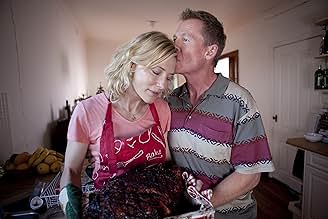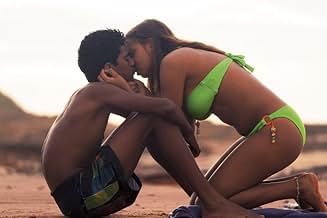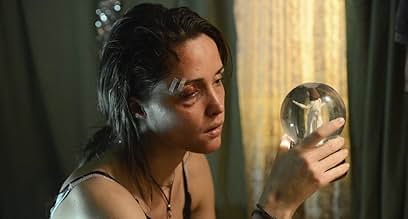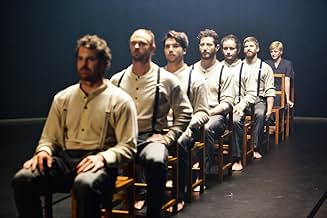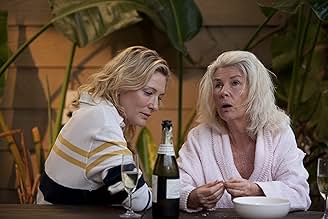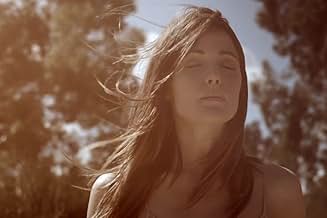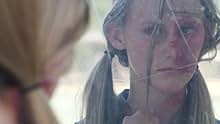IMDb-BEWERTUNG
5,8/10
1580
IHRE BEWERTUNG
Füge eine Handlung in deiner Sprache hinzuA collection of short films based on stories by Australian writer Tim Winton.A collection of short films based on stories by Australian writer Tim Winton.A collection of short films based on stories by Australian writer Tim Winton.
- Auszeichnungen
- 6 Gewinne & 9 Nominierungen insgesamt
Colin Friels
- Narrator (segment "Ash Wednesday")
- (Synchronisation)
Tim Winton
- Adult Narrator (segment "Big World")
- (Synchronisation)
Empfohlene Bewertungen
THE TURNING is a breath of fresh air, an experimental Australian film based of the short stories of the gifted writer Tim Winton. Every aspect of the film is unique, challenging and utterly mesmerizing. The quiet animated opening sequence 'Ash Wednesday' (based on TS Eliot's poem of the same name, is simply an eerie animation narrated by off screen Colin Friels and sets the mood for the episodes to come.
The film is divided in to eighteen short segments - Big World, Aquifier, Abbreviation, Ash Wednesday, Damaged Goods, Small Mercies, On Her Knees, Cockleshell, The Turning, Sand, Family, Long, Clear View, Reunion, Commission, Fog, Boner McPharlin's Moll, Immunity (a wordless, modern dance piece), and Defender – and presented as a three- hour epic based on Tim Winton's short story collection, THE TURNING, and explores the impact of past on present, how the seemingly random incidents that change and shape us can never be escaped or let go of. All of the stories are bound together by recurring themes: the passing of time, regret, addiction and obsession.
The stories are set on a coastal stretch of Western Australia, 'a stunning collection of connected stories is about turnings of all kinds -- changes of heart, slow awakenings, nasty surprises and accidents, sudden detours, resolves made or broken. Brothers cease speaking to each other, husbands abandon wives and children, grown men are haunted by childhood fears. People struggle against the weight of their own history and try to reconcile themselves to their place in the world. With extraordinary insight and tenderness, Winton explores the demons and frailties of ordinary people whose lives are not what they had hoped.'
Each of the book's 18 stories is interpreted on film by a different team of filmmakers, including collaborators from the worlds of theatre, photography, visual art and dance. Characters re-appear in different episodes at different stages of their lives, fleshed out in snapshots that explore recurring themes from different angles. The lives of fishermen, surfers, AFL players, the working class and angst-ridden suburbanites are chronicled with sometimes dark themes, including alcoholism, child homicide and police corruption. A number of key episodes feature Aboriginal characters and symbols. Though the film courts the mystical, it's grounded with romance and macabre suspense.
Overlooked by many, this film is one for the most poetically satisfying visual experiences and deserves far more attention than it has received.
The film is divided in to eighteen short segments - Big World, Aquifier, Abbreviation, Ash Wednesday, Damaged Goods, Small Mercies, On Her Knees, Cockleshell, The Turning, Sand, Family, Long, Clear View, Reunion, Commission, Fog, Boner McPharlin's Moll, Immunity (a wordless, modern dance piece), and Defender – and presented as a three- hour epic based on Tim Winton's short story collection, THE TURNING, and explores the impact of past on present, how the seemingly random incidents that change and shape us can never be escaped or let go of. All of the stories are bound together by recurring themes: the passing of time, regret, addiction and obsession.
The stories are set on a coastal stretch of Western Australia, 'a stunning collection of connected stories is about turnings of all kinds -- changes of heart, slow awakenings, nasty surprises and accidents, sudden detours, resolves made or broken. Brothers cease speaking to each other, husbands abandon wives and children, grown men are haunted by childhood fears. People struggle against the weight of their own history and try to reconcile themselves to their place in the world. With extraordinary insight and tenderness, Winton explores the demons and frailties of ordinary people whose lives are not what they had hoped.'
Each of the book's 18 stories is interpreted on film by a different team of filmmakers, including collaborators from the worlds of theatre, photography, visual art and dance. Characters re-appear in different episodes at different stages of their lives, fleshed out in snapshots that explore recurring themes from different angles. The lives of fishermen, surfers, AFL players, the working class and angst-ridden suburbanites are chronicled with sometimes dark themes, including alcoholism, child homicide and police corruption. A number of key episodes feature Aboriginal characters and symbols. Though the film courts the mystical, it's grounded with romance and macabre suspense.
Overlooked by many, this film is one for the most poetically satisfying visual experiences and deserves far more attention than it has received.
This is a collection of short films in Australia about various aspects of life that presents with some kind of turning point.
I watched this for the big names such as Cate Blanchett and Rose Byrne, Ann's I knew I probably wouldn't enjoy this film anyway. Indeed, the first segment is already not so good, it tells a story of a family spending Christmas together but they go to the wrong house. I can't quite work out what is so special about this story, apart from Cate's performance. The Rose Byrne story is the best out of the whole film, it tells a distinct change in life because of a significant turning point. The rest of the stories are not very good. The sand story is just ridiculous. I couldn't even understand it!
I watched this for the big names such as Cate Blanchett and Rose Byrne, Ann's I knew I probably wouldn't enjoy this film anyway. Indeed, the first segment is already not so good, it tells a story of a family spending Christmas together but they go to the wrong house. I can't quite work out what is so special about this story, apart from Cate's performance. The Rose Byrne story is the best out of the whole film, it tells a distinct change in life because of a significant turning point. The rest of the stories are not very good. The sand story is just ridiculous. I couldn't even understand it!
Most movies with multiple stories are shallow even if well acted. The script, acting, and stories are all emotional - sharing life at a precipice of sorts, a turning point, where emotions and feelings change. As those of us who have lived a bit, those turning points are often revealing and emotional, and change our outlook.
Some reviews of this moving denied the reality of life's challenges - this is not a film of Disney characters or where a Marvel character saves the world - just super acting by many superb actors in emotional scenes.
Whether it be seeing a divorced dad with a son he doesn't know or reliving painful memories or living painful lives, I applaud the directing of diverse stories with a similar tenor : life's challenges being shown and felt.
Some reviews of this moving denied the reality of life's challenges - this is not a film of Disney characters or where a Marvel character saves the world - just super acting by many superb actors in emotional scenes.
Whether it be seeing a divorced dad with a son he doesn't know or reliving painful memories or living painful lives, I applaud the directing of diverse stories with a similar tenor : life's challenges being shown and felt.
This is an Australian art-house film or rather films. It is the idea of Robert Connelly who brought us the excellent 'Balibo' in 2009. He has brought together seventeen directors and writers to make a version of the book 'The Turning' by Tim Winton. This is essentially a collection of short stories that all have the theme of 'turning' or changing and to say it is a mixed bag is a massive understatement.
Each segment or 'chapter' has been made as a separate film and that can be a bit confusing as you lose the flow of the overall piece; but that is highly intentional. The acting is all well above average with some notable performances. There are some themes that seem to be recurring, such as disfigurement, poetry, narration, regret and more over loss. The subjects vary as much as anything else, including first love, hidden childhood memories, trailer parks, Jesus and Volks Wagens. We also have some modern interpretative dance - just to prove how art-house the whole ensemble is.
Now as I said this is ambitious and in most respects that ambition is realised. However, this is 173 minutes long and, as such, required some commitment to stay the course. It should be the sum of all its parts but that too is a 'big ask' as is the colloquial these days. The parts are so different that I felt some were completely out of kilter with the rest and others almost stand alone stories. And I think that is the intention here, after all they are all short stories and so would want to be both different and stand alone. But that is also the weak point as you will inevitably like some an awful lot more than others.
I am a fan of alternative and art-house cinema but this did require bearing with as I said it is nearly three hours long, but it is still a commendable effort but I would not be able to sit through it twice.
Each segment or 'chapter' has been made as a separate film and that can be a bit confusing as you lose the flow of the overall piece; but that is highly intentional. The acting is all well above average with some notable performances. There are some themes that seem to be recurring, such as disfigurement, poetry, narration, regret and more over loss. The subjects vary as much as anything else, including first love, hidden childhood memories, trailer parks, Jesus and Volks Wagens. We also have some modern interpretative dance - just to prove how art-house the whole ensemble is.
Now as I said this is ambitious and in most respects that ambition is realised. However, this is 173 minutes long and, as such, required some commitment to stay the course. It should be the sum of all its parts but that too is a 'big ask' as is the colloquial these days. The parts are so different that I felt some were completely out of kilter with the rest and others almost stand alone stories. And I think that is the intention here, after all they are all short stories and so would want to be both different and stand alone. But that is also the weak point as you will inevitably like some an awful lot more than others.
I am a fan of alternative and art-house cinema but this did require bearing with as I said it is nearly three hours long, but it is still a commendable effort but I would not be able to sit through it twice.
Wusstest du schon
- WissenswertesThe animated segment is based on the poem, 'Ash Wednesday', by T.S. Eliot.
- Alternative VersionenA 90-minute version for TV broadcast (on ABC1 in Australia) contains only 8 of the 17 stories, re-edited into a new running order: "Reunion", "Aquifer", "On Her Knees", "The Turning", "Long, Clear View", "Commission", "Cockleshell", and "Sand". The remaining 9 stories not included were made available online at ABC iView for two weeks from the time of broadcast (23 February, 2013).
- SoundtracksJazz Suite No. 2 (Waltz No.2)
(segment 'Long Clear View')
Written by Dmitri Shostakovich
Performed by Rundfunk-Sinfonieorchester Berlin (as Berlin Radio Symphony), conducted by Steven Sloane
Top-Auswahl
Melde dich zum Bewerten an und greife auf die Watchlist für personalisierte Empfehlungen zu.
- How long is The Turning?Powered by Alexa
Details
Box Office
- Weltweiter Bruttoertrag
- 1.110.918 $
- Laufzeit3 Stunden
- Farbe
Zu dieser Seite beitragen
Bearbeitung vorschlagen oder fehlenden Inhalt hinzufügen





